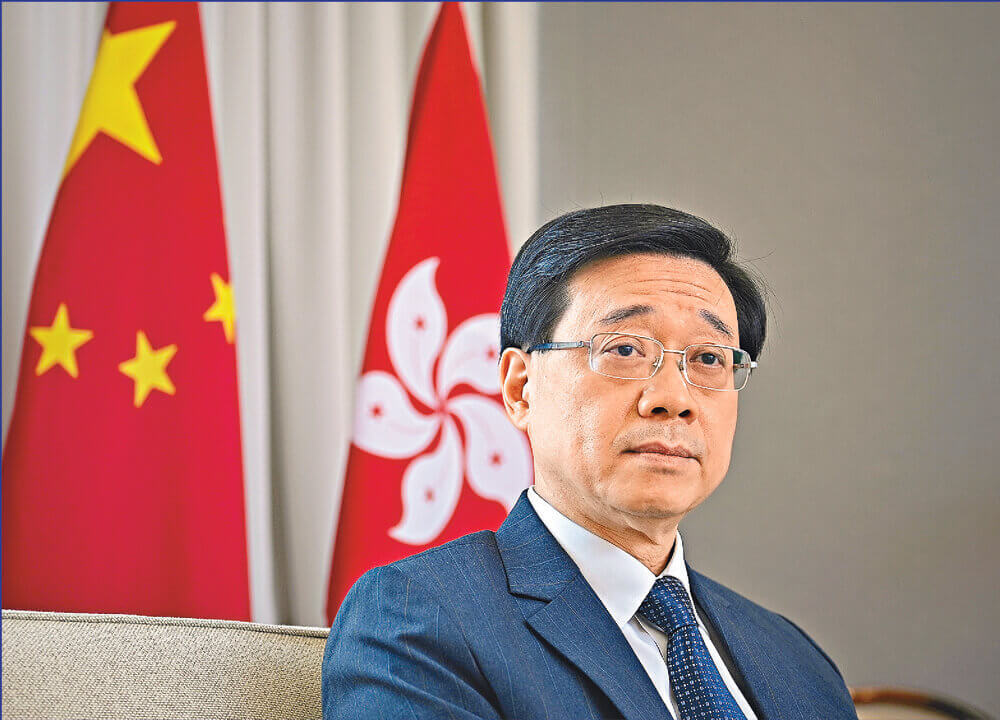The sole candidate running for Hong Kong’s chief executive post, John Lee, won the election on Sunday with over 99% of the votes. The 64-year-old, who is the financial hub’s former deputy leader, won 1,416 votes out of the 1,461 votes in an overwhelmingly pro-Beijing election committee. Eight of the electors voted against Lee, while four votes were declared invalid. Lee required 750 votes to win.
The new leader said after his victory: “I have risen to this position today from the nobody I once was. I will be responsible not only to the Chinese government, but also to the Hong Kong people.” Acknowledging the several challenges in his path ahead, he added, “I am confident that the next administration will boldly and capably go about tackling the issues that Hong Kong faces.”
Chief Executive-elect John Lee secured 99% of the vote in Sunday's small-circle leadership election, after he led a panel last year which vetted all voters. Eight voted against him, four cast blank ballots. He is set to take office on July 1. In full: https://t.co/93upayd51q pic.twitter.com/F5h4fZJnyh
— Hong Kong Free Press HKFP (@hkfp) May 8, 2022
He also vowed to unify the city after three years of turmoil due to pro-democracy protests and stringent COVID-19 pandemic restrictions that closed the city off from the rest of the world. “After the past three difficult years, Hong Kong can and must rise again,” Lee declared at the Hong Kong Convention and Exhibition Centre. “I pledge that I will work hard to build a government led by a responsible team able to solve Hong Kong’s problems... so that Hong Kong can fly high again,” he said.
During his half-hour speech that was broadcasted live on local television, Lee also outlined the four focus areas of his policies: strengthening governance; providing better and faster housing; boosting the financial hub’s competitiveness and pursuing sustainable development; and building a “caring, inclusive society with greater upward mobility for its youth.”
Hong King’s new leader, the hard-line policeman John Lee, was elected by a pro-Beijing committee constituting 0.02% of HK’s population. ‘This is a real demonstration of democratic spirit’ said China’s HK Affairs Office. Lee was the only candidate.
— John Simpson (@JohnSimpsonNews) May 8, 2022
Following Lee’s victory, the Hong Kong and Macao Affairs Office of China’s State Council on Sunday said that Hong Kong had “taken a fresh look with a new electoral system and is poised for a brighter future at a new starting point.” It further added that “solid facts” had now proven that “the new system is a good one that follows the “One Country, Two Systems” principle and is suited to Hong Kong’s realities.”
Similarly, Chinese state-owned media also hailed the election process. Xinhua News Agency lauded the election saying that it was “held in full accordance with laws and regulations, as well as in a fair, impartial and open manner, fully demonstrating the advantages of the new electoral system.”
KPMG, Deloitte, EY and PwC among western multinationals and local tycoons taking out newspaper adverts congratulating sole candidate for the job - John Lee - on becoming Hong Kong's new leader, following a rubber-stamp selection process https://t.co/bsyWCcCRiK pic.twitter.com/BpN0LFBk2u
— AFP News Agency (@AFP) May 9, 2022
Lee, a former policeman who oversaw the implementation of China’s national security law in the autonomous region, has been a staunch advocate of the Beijing-backed legislation. In March, Lee told the United Nations Human Rights Council that the 2020 security law had “restored peace and stability” by ending the “violence, destruction and chaos” of the protests.
In 2020, Beijing passed a wide-ranging national security legislation in Hong Kong that critics accuse of destroying political freedoms and allowing China to strengthen its control over the semi-autonomous territory. However, China has repeatedly stated that the law is needed to tackle unrest and instability in the city, which it argues has become “a base of subversive activities” over the years.
Hong Kong's next leader John Lee wins 99% of the vote, putting him in the company of Chechnya's Ramzan Kadyrov and Syria's Bashar al-Assad. Except al-Assad actually only got 95% of the vote in his last election, so the Damascus despot came in a little shabbier than Lee.
— Melissa Chan (@melissakchan) May 8, 2022
Lee’s election to the top post is expected to further curb civil liberties in the semi-autonomous region that China considers to be part of its own territory. He succeeds Carrie Lam, who was in the post for five years.

